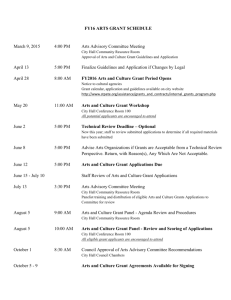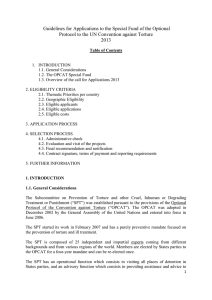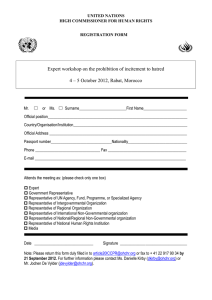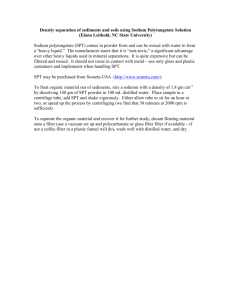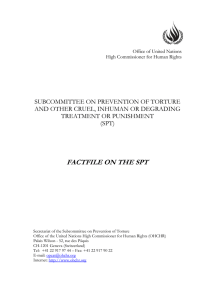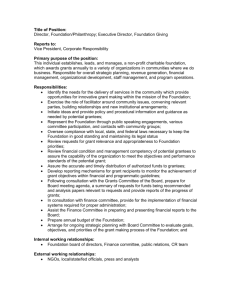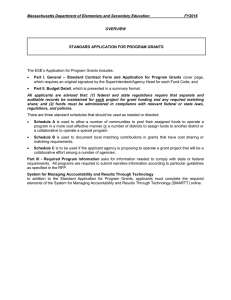Guidelines for Applications to the Special Fund of the Optional
advertisement
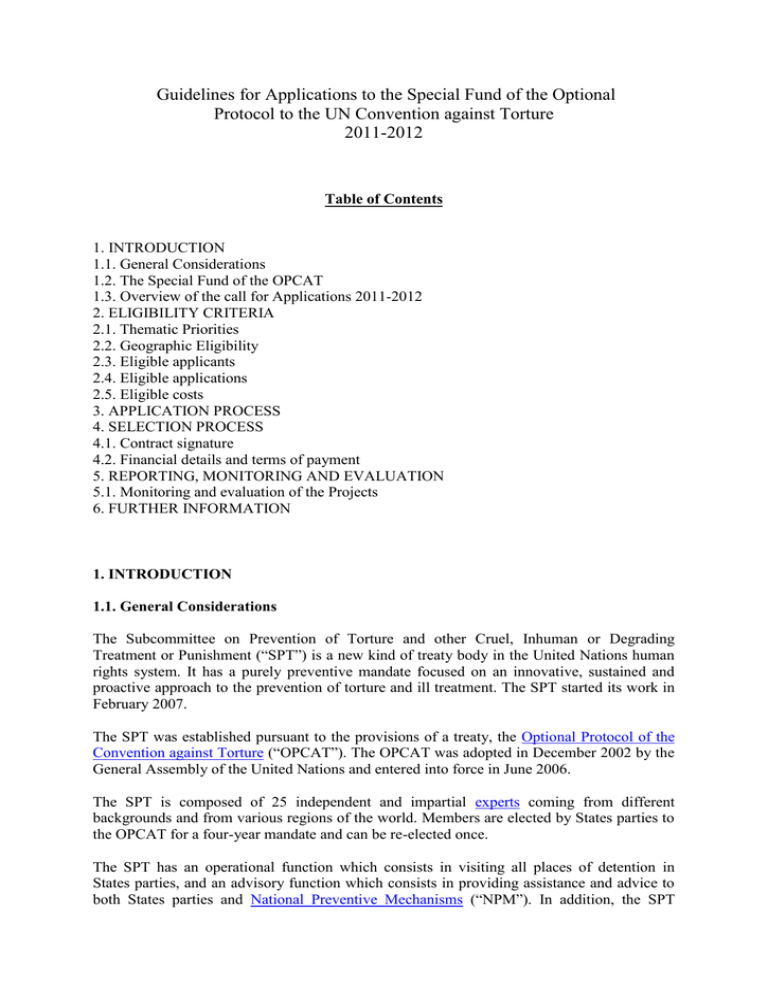
Guidelines for Applications to the Special Fund of the Optional Protocol to the UN Convention against Torture 2011-2012 Table of Contents 1. INTRODUCTION 1.1. General Considerations 1.2. The Special Fund of the OPCAT 1.3. Overview of the call for Applications 2011-2012 2. ELIGIBILITY CRITERIA 2.1. Thematic Priorities 2.2. Geographic Eligibility 2.3. Eligible applicants 2.4. Eligible applications 2.5. Eligible costs 3. APPLICATION PROCESS 4. SELECTION PROCESS 4.1. Contract signature 4.2. Financial details and terms of payment 5. REPORTING, MONITORING AND EVALUATION 5.1. Monitoring and evaluation of the Projects 6. FURTHER INFORMATION 1. INTRODUCTION 1.1. General Considerations The Subcommittee on Prevention of Torture and other Cruel, Inhuman or Degrading Treatment or Punishment (“SPT”) is a new kind of treaty body in the United Nations human rights system. It has a purely preventive mandate focused on an innovative, sustained and proactive approach to the prevention of torture and ill treatment. The SPT started its work in February 2007. The SPT was established pursuant to the provisions of a treaty, the Optional Protocol of the Convention against Torture (“OPCAT”). The OPCAT was adopted in December 2002 by the General Assembly of the United Nations and entered into force in June 2006. The SPT is composed of 25 independent and impartial experts coming from different backgrounds and from various regions of the world. Members are elected by States parties to the OPCAT for a four-year mandate and can be re-elected once. The SPT has an operational function which consists in visiting all places of detention in States parties, and an advisory function which consists in providing assistance and advice to both States parties and National Preventive Mechanisms (“NPM”). In addition, the SPT cooperates, for the prevention of torture in general, with the relevant United and mechanisms as well as with international, regional, and national organizations. The SPT presents a public annual report on its activities to against Torture and convenes three times a year for sessions of one week United Nations Office at Geneva. Nations organs institutions or the Committee duration at the At the end of its country visits, the SPT communicates its recommendations and observations to the State by means of a confidential report, and if necessary, to the NPMs. However, State parties are encouraged to request the SPT to publish the visit reports. Since its establishment, the SPT has visited the following countries (in chronological order): Mauritius Maldives Sweden Benin Mexico Paraguay Honduras Cambodia Lebanon Bolivia Liberia Ukraine Brazil The following State Parties have requested the SPT to publish their respective visit reports: Maldives Sweden Benin Mexico Paraguay Honduras 1.2. The Special Fund of the OPCAT The Special Fund of the Optional Protocol to the UN Convention against Torture was established in accordance with Article 26 of the OPCAT, adopted on 18 December 2002. The overall purpose of the Special Fund (hereinafter referred to as “the Fund”) is to help finance the implementation of the recommendations made by the Subcommittee on Prevention of Torture after a visit to a State Party, as well as education programs of the national preventive mechanisms (NPM). Contributions to the Fund may be accepted from governments, intergovernmental or nongovernmental organizations, private-sector organizations and the public at large, in accordance with the United Nations Financial Regulations and Rules. Only un-earmarked resources may be accepted. The Fund is managed by the United Nations Office of the High Commissioner for Human Rights (hereafter, the “Fund Manager”), in conformity with the United Nations Financial Rules and Regulations and the relevant policies and procedures promulgated by the Secretary-General. The SPT agreed on an interim scheme for the first Call for Applications, 2011-2012, to be administered by the Fund Manager via its Grants Committee. Only applications relating to recommendations contained in published Subcommittee visit reports, and focussing on priority thematic issues, as determined by the Subcommittee in plenary, will be considered at this stage. 1.3. Overview of the Call for Applications 2011-2012 The Call for Applications for 2011-2012 will accept project applications from eligible applicants aimed at implementing recommendations made by the Subcommittee on Prevention of Torture after a visit to a State party, provided these recommendations are contained in a report that has become public by the request of the State party. Applicants may request grants of up to US$ 20,000 for project applications implemented between 1 January 2012 to 31 December 2012. For 2011-2012, four thematic priorities have been established: Notifications of fundamental rights to detainees in a language which they can understand Improving recreational and/or vocational activities for juveniles in detention Basic training programmes for detention personnel (with the inclusion of a focus on health care) Any other specific recommendation in the visit reports that details a pressing and compelling need. All applications must be submitted in English, French or Spanish. The final number of grants awarded will depend on the proposed budgets of selected project applications, as well as the financial resources of the Fund. The Call for Applications 2011-2012 will close on 30 November 2011 at 24:00 CET. 2. ELIGIBILITY CRITERIA 2.1. Thematic Priorities The SPT has identified recommendations in respect of which applications will be considered for the Call for Applications 2011-2012. They have to relate to: Notifications of fundamental rights to detainees in a language which they can understand Improving recreational and/or vocational activities for juveniles in detention Basic training programmes for detention personnel (with the inclusion of a focus on health care) Any other specific recommendation in the visit reports that details a pressing and compelling need. All project applications should respond to at least one of the above thematic priorities for 2011-2012. The Fund Manager encourages applicants to reflect on the following basic principles in applications wherever possible: • An ethical, human rights-based approach, • Partnership with other stakeholders, • Project design with the potential for replication, • Sustainability, • Support of additional funding sources. The Fund seeks to identify good practices, combined with an environment where these practices can be shared, to enable development and evolution into new and sustainable practices. 2.2. Geographic Priorities Only applications relating to recommendations contained reports of visits by the Subcommittee that have been published, and hence are no longer confidential, will be considered at this stage. Therefore, the Call for Applications 2011-2012 is limited projects to be implemented in the following countries: Maldives Sweden Benin Mexico Paraguay Honduras Within the criteria highlighted above, all applications will be given fair and equitable consideration regardless of the geographic location of the applicant or the location of the proposed activities. 2.3. Eligible applicants As a rule, applications may be submitted by: State parties having been visited and having agreed to the publication of the SPT report National Preventive Mechanisms of these States parties. Applications may be submitted as well by National Human Rights Institutions (NHRI), if fully compliant with the Paris Principles and by Non-Governmental organizations (NGO), in particular if the proposed projects are implemented in cooperation with eligible States parties and/or NPMs. 2.4. Eligible applications A project is a coherent set of activities with defined operational objectives, target groups and planned outcomes. A project must achieve specific aims and accomplish expected results within a limited timeframe. Projects should be designed in response to the specific needs of the identified target group(s). Eligible project applications under the current Call for Applications will have a maximum duration of 12 months, beginning not earlier than 1 January 2012 and ending no later than 31 December 2012. Eligible applications should not exceed a request of up to US$20,000. Only one application per applicant can be considered admissible. They will focus on implementing the recommendations of the SPT, as identified in their country visit reports, relating to the following priority themes: Notifications of fundamental rights to detainees in a language which they can understand Improving recreational and/or vocational activities for juveniles in detention Basic training programmes for detention personnel (with the inclusion of a focus on health care) Any other specific recommendation in the visit reports that details a pressing and compelling need. All project applications should therefore relate to at least one of the above priorities but do not necessarily have to address all. 2.5. Eligible costs Only eligible costs can be taken into account. These costs must: Be necessary for carrying out the project activities; Have actually been incurred by the applicant during the implementation period; Comply with the principles of sound financial management, in particular value for money and cost-effectiveness; Be recorded in the applicants’ accounts or tax documents, be identifiable and verifiable and be backed by original supporting documents. Subject to these conditions, eligible direct costs should correspond to market rates and include: The cost of staff assigned to the project, corresponding to actual project staff salaries plus social security charges and other remuneration-related costs. Procurement of materials and equipment strictly essential for the achievement of the objectives of the project The cost of consumables and supplies The cost of travel and accommodation for participants to trainings Any other relevant cost deemed essential for the achievement of the objectives of the project An estimate of all activity costs needs to be provided using the attached budget template. The Fund Manager reserves to right to earmark part of the totality of a grant to specific budget lines. Indirect costs (overheads) as a lump sum are not eligible. Other ineligible costs are: • Debts and provisions for losses; • Interest owed; • Items already financed in another framework, project or by another donor; • Currency exchange losses; • Contingency reserve. The proposed costs must be realistic. Any excessive, unrealistic or unjustified estimation will exclude the project from financing. The amount requested from the Fund may be combined with other existing funds within the organization or with funds from other sources. 3. APPLICATION PROCESS The Call for Applications 2011-2012 will be issued on 1 November 2011. Applicants have one month to complete the application form, as the deadline for applying is set at 30 November 2011. No applications will be accepted after the deadline has passed. Applications may be submitted in English, French of Spanish. Applications should be submitted by email, within the established deadline, to the following address: opcatfund@ohchr.org A signed paper copy should be sent as well to the following address: Optional Protocol to the Convention against Torture (OPCAT) – Subcommittee on Prevention of Torture (SPT) - Special Fund Secretariat Human Rights Treaties Division (HRTD) Office of the United Nations High Commissioner for Human Rights (OHCHR) Palais Wilson - 52, rue des Pâquis CH-1201 Geneva (Switzerland) Mailing address UNOG-OHCHR CH-1211 Geneva 10 (Switzerland) Tel.: +41 22 917 97 72 Fax: +41 22 917 90 08 E-mail: opcatfund@ohchr.org Application information (including this document, the Application Form and Budget Form) will be available on the website of the SPT: http://www2.ohchr.org/english/bodies/cat/opcat/index.htm The project proposal shall be written clearly and accurately and shall not exceed 10 full pages (size A4), including the budget. All fields must be completed in order for the project to be considered for funding. Applicants also have the option of submitting a Letter of Reference to support their application. This letter can take any form, and can be provided by any individual/institution who you feel may support your application for funding. A letter of reference is not required, but if desired, the letter must be submitted at the time of application. CVs of staff to be paid under the Fund’s grant should be attached to the application. 4. SELECTION PROCESS The application process will end on 30 November 2011 at 24:00 CET. The applications will be evaluated and considered for funding by the Fund Manager and its Grants Committee. The evaluation of the applications will be carried out according to the following steps: Administrative check The Fund Manager will perform administrative checks of applications as they are received. Applications will not be further considered if: • The application is incomplete or out of mandate; • The applicant, project proposal or costs are not eligible; or • The application was received after 30 November 2011. At this stage, no notifications will be sent to applicants. Evaluation of the projects and background check An extensive evaluation of the quality of applications, including the enclosed budget and the capacity of the applicant, will be carried out in accordance with preset evaluation criteria by the Fund Manager. Final recommendation and notification The OHCHR Grants Committee will select applications based on the same evaluation criteria used by the Fund Manager. Following final recommendations by the OHCHR Grants Committee, the Fund Manager will then ensure that all recommended applications satisfy the technical requirements, rules and regulations of the United Nations. Upon confirmation of the Grants Committee’s recommendations, applicants will be informed about the status of their application. As a rule, grants will not exceed US$20,000. The approval of grants and the actual disbursement of approved grants will be subject to the availability of funds. 4.1. Contract signature Following the implementation of the OHCHR Grants Committee’s recommendations by the Fund Manager, selected applicants (hereinafter referred to as “grantees”) will be offered a contract to be signed with OHCHR no later than 1 February 2012. Upon the signing of the agreement, the list of all selected projects will be published on the Fund’s website. 4.2 Financial details and terms of payment Grantees will receive the awarded grant in their bank account via bank transfer. The banking details will be collected from all applicants in order to reduce any delay in payment. As customary for OHCHR grants, 80% of the grant will be paid upon signature of the contract, and the remaining 20% upon receipt of a satisfactory final Narrative and Financial report on the use of the grant. 5. REPORTING, MONITORING AND EVALUATION 5.1. Monitoring and evaluation of the Projects After receiving notification of the award of the grants, the implementation by the grantees of the selected projects will begin, no earlier than 1 January 2012. Grantees are responsible for the monitoring and evaluation of progress made. The implementing grantees must provide to the Fund Manager: - Brief periodic written progress reports on request. - Final narrative report 2 months after the end of the implementation period of the project, no later than 1 March 2013(see Narrative Report form on the website). - Annual financial statements by 1 March 2013. The Fund Manager reserves the right to select grantees to be independently audited by an external auditor. In such cases, grantees will be informed of such procedure prior to the signing of the Contract with OHCHR, and any costs associated to the auditing might be charged to the Fund’s grant. In order to better understand and evaluate the work done and planned, as well as the management of the grants, members of the OHCHR Grants Committee, the Fund Manager, OHCHR Desk Officers and/or other UN staff, may visit projects and meet with staff members of the Organization implementing the project. During any visit, the UN staff or member of the Board, may be accompanied by non-UN personnel, as needed (e.g. auditor, translator, doctor, etc.), who would also be bound by UN rules of non-disclosure of information. All grantees are expected to fully cooperate with the officials undertaking the visit. A confidential report on this evaluation will be prepared for consideration by the Grants Committee. 33. Should the evaluation of the project be negative, or incomplete due to the limited access to files, staff and/or beneficiaries, the Fund Manager or the Grants Committee will cancel any pending grant, discontinue funding for the project, or request a total or partial refund of the grant, as appropriate. 6. FURTHER INFORMATION Any questions regarding the application process for the Call for Applications 2011-2012 may be sent to the following e-mail address: opcatfund@ohchr.org. The Fund will not give prior opinion on the eligibility of applicants or projects nor will it respond to individual inquiries regarding project selection.
